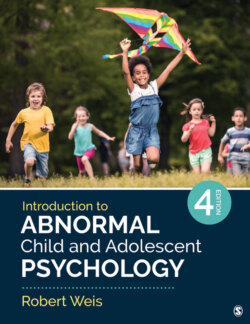Читать книгу Introduction to Abnormal Child and Adolescent Psychology - Robert Weis - Страница 102
На сайте Литреса книга снята с продажи.
Parenting Behavior
ОглавлениеAlthough parenting practices differ considerably across families and cultures, psychologists have identified at least two dimensions of parenting that are important to development (Kerig, 2016). The first dimension, parental responsiveness, refers to the degree to which parents display warmth and acceptance toward their children, orient their behavior to meet their children’s needs in a sensitive and responsive fashion, and engage their children through shared activities and positive emotions. The second dimension, parental demandingness, refers to the degree to which parents have age-appropriate expectations for their children’s behavior, clearly establish and consistently enforce rules governing their children’s actions, and supervise their children’s activities (Bornstein, 2016).
Diana Baumrind (1991) classified caregivers into four parenting types, based on the degree to which they endorse responsive and demanding parenting behaviors. Authoritative parents are both responsive and demanding toward their children. These parents set high, but age-appropriate, expectations for their children’s behavior and help their children meet these expectations by providing them with nurturance and support. They are assertive in their interactions with their children but not intrusive. They use discipline to support their children and to teach them how to regulate their own behavior; they do not use discipline punitively. They value responsibility but also recognize children’s needs for sensitive and responsive care.
Authoritarian parents show high levels of demandingness but low levels of responsiveness. These parents value obedience and achievement in their children. They set high standards for their children and firm limits on their children’s behaviors. They establish clear rules and expect them to be obeyed. These parents are highly involved in their children’s lives, providing them with organized, structured, and supervised educational, extracurricular, and social experiences. They strive to teach self-reliance and responsibility to their children, but they may give their children less support and encouragement to live up to these responsibilities.
Indulgent parents show high levels of responsiveness but low levels of demandingness. These parents are described as lenient, nondirective, and permissive. They value autonomy and exploration in their children. They place few limits on their children’s behaviors and are reticent to discipline.
Uninvolved parents show low levels of both responsiveness and demandingness. These parents display infrequent or inconsistent interactions toward their children, often because they are distracted by other psychosocial stressors (e.g., working multiple jobs, caring for an elderly relative).
Overall, children of authoritative parents display the best developmental outcomes. On average, these children show well-developed social skills, emotional competence, and capacity for self-regulation and self-direction. Children of authoritarian parents tend to perform well academically but are at risk for low self-esteem and peer problems, especially in late childhood and early adolescence. Children of indulgent parents often display high levels of self-esteem and well-developed social skills, but they are susceptible to behavior problems during childhood and substance use problems during adolescence. Children of uninvolved parents typically display the poorest outcomes. These children are at particular risk for low academic achievement, behavior problems, and emotional difficulties across development (Baumrind, 1991; Weiss & Schwarz, 1996).
Review
Temperament refers to the way infants and young children organize their behavior in response to novel environmental stimuli. The goodness-of-fit between the children’s temperament and their caregiving environment is important to development.
Attachment refers to the emotional bond between caregiver and child that serves to promote safety. Attachment is innate; however, the quality of attachment depends on the sensitivity and responsiveness of the caregiver toward the child.
Caregivers can be classified into one of four parenting types based on their responsiveness and demandingness: (1) authoritative, (2) authoritarian, (3) indulgent, and (4) uninvolved.
